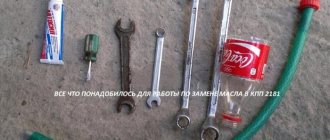Comparison of technical characteristics of Rosneft and Lukoil motor oils
A car owner who not only mercilessly exploits his vehicle, but strives to maintain it in proper technical condition, does not save money when purchasing consumables. However, even such a caring owner has to face difficult choices. In particular, when visiting a car dealership, the question arises which oil is better to choose: Lukoil or Rosneft. Finding the answer to such a question is quite difficult for a beginner, so we are ready to make the task easier, provide ready-made information, after reading which you will be able to figure out which oil product is best to buy to put into the engine of your own car.
Viscosity and classification
First of all, you need to be able to select the correct viscosity of the engine oil. Often, the manufacturer specifies not only this parameter, but also provides a specific lubricant. If you follow these simple recommendations and don’t complicate things, the car’s power unit will thank you in the form of long-term, uninterrupted operation. On some brands of cars, the appropriate viscosity is indicated on the oil filler cap.
API classification of engine oil is also very important. The fact is that modern diesel and gasoline engines require a certain additive package, which is not necessary for older engines. For example, the API SM conformity mark was approved in 2010 and is suitable for the most modern gasoline internal combustion engines. There are also anti-oxidation additives and much improved viscosity characteristics at low temperatures. Now let's move on.
Features of domestic oils
Those who believe that only foreign auto chemical products meet international requirements are seriously mistaken, since domestic oil may turn out to be even better in some technical and operational parameters. In addition, the domestic product not only has good parameters, but its price is also more attractive than that of an expensive foreign analogue. Also, domestic oil is successfully combined with fuel, which is sold at gas stations. Naturally, the composition and quality of domestic fuel differ significantly from that offered outside the home country.
As practice shows, low-quality domestic fuel can conflict with a good foreign engine oil product. Some car owners deliberately purchase low-quality fuel, not wanting to incur additional costs. Auto stores offer a wide range of domestic oil products aimed at car engines. Let's analyze the products of two popular manufacturers:
- Rosneft (also has another popular name - TNK);
- Lukoil.
Both of these manufacturers are very popular among domestic motorists.
Prices
When deciding which is better - Lukoil or Gazpromneft, you cannot ignore the cost of fuel. Here are the prices presented by operators for different brands of gasoline and diesel. Please note that the average information is given; the actual cost may differ slightly to a higher or lower cost.
| Company | AI-92 | 95 | 98 | 100 | Dt |
| Lukoil | 45,29 | 48,59 | 56,20 | 56,20 | 48,50 |
| Shell | 45,44 | 49,43 | 62,44 | — | 52,59 |
| E.K.A. | 45,03 | 48,72 | 60,83 | — | 49,07 |
| GazpromNeft | 44,55 | 48,59 | 58,55 | — | 48,18 |
| RosNeft | 44,55 | 49,14 | 60,25 | — | 48,00 |
| Neftmagistral | 43,74 | 48,03 | 58,84 | — | 48,28 |
| Route | 45,04 | 47,73 | — | — | 48,28 |
| TatNeft | 45,44 | 47,53 | 59,74 | — | 46,87 |
| TNK | 43,45 | 48,24 | 60,15 | — | 47,98 |
For the purity of the experiment, we took data for Moscow and the region; the price in the regions may differ from the information presented. We can conclude that it offers a lower cost. However, you can only decide which gas station is best by knowing which fuel is better.
Motor gasoline market:
Comparison by main characteristics
Realizing that both Lukoil and Rosneft are successful manufacturers offering quality products, you still have to make a comparison to understand which oil to buy. Let's consider how motor oil copes with loads under different operating modes of the vehicle.
Starting in the cold
If nature decides to present an unexpected surprise, accompanied by a sharp drop in temperature, car owners get a chance to check the quality of their motor oil. In severe frosts, starting the engine of your favorite car turns out to be quite difficult. You've probably seen how avid motorists have to abandon their cars and take public transport to get to work. This is exactly the case when low temperatures did not allow the engine to start.
Rosneft oil fluid demonstrates good starting characteristics. At the same time, experts draw attention to the fact that even with a strong decrease in temperature, the viscosity of Rosneft oil remains quite high. However, it should be noted that Rosneft MM contains a large amount of sulfur, which causes serious contamination of the engine. But Lukoil provides engine oil fluid with low sulfur content, and this product has a better viscosity index.
Power and consumption
It is also useful to pay attention to the characteristics that affect engine power performance. In this matter, Lukoil also takes a leading position, ahead of Rosneft. We also draw your attention to the fact that Rosneft oil provokes greater fuel consumption during engine operation. For this reason, there are more and more people wanting to purchase Lukoil’s product.
Chemical composition
If you compare motor oils by chemical composition, it is useful to pay attention to the ash content. It is significantly lower for Rosneft, but the cleaning characteristics are much better for Lukoil. Lukoil also benefits from containing more zinc.
But Rosneft’s oil product is ahead of Lukoil in terms of indicators:
- critical load;
- welding loads;
- badass index.
By temperature
Engine oil will meet its specifications if the vehicle is operated under specified conditions. Motor fluid from Lukoil is capable of allowing the engine to function successfully at a maximum temperature drop of minus twenty-five degrees. But Rosneft oil can withstand even thirty-degree frost. If we compare the focus on maximum temperature, then Lukoil wins, the product is able to withstand 40-degree heat, while Rosneft maintains its characteristics up to the maximum maximum - 35 degrees.
Price
If you pay attention to the price indicator, then the Rosneft product is suitable for those car owners who want to save on everything. Rosneft motor oils are cheaper than Lukoil products, however, it should be noted that the difference is not very significant.
Popularity comparison
Comparing Lukoil and Rosneft motor oils in terms of popularity, it is easy to understand that Lukoil’s product is sold out faster, since most car owners prefer to purchase this particular motor fluid, which is ideal for any domestic car. Although we will not deny that some motorists actively purchase only Rosneft oils and remain absolutely satisfied with their performance characteristics.
So, we hope that, having familiarized yourself with the main distinguishing features of these two manufacturers, you will be able to choose for yourself the best option for engine oil that will ensure the successful functioning of your car.
Diesel fuel
Unfortunately, Russian-made diesel fuel is noticeably inferior in quality to imported ones. Swedish diesel fuel is considered to be of the highest quality, as its sulfur content is minimal. German and Japanese diesel fuels are slightly inferior to Scandinavian ones. Therefore, if you have the opportunity to choose, it is worth considering that imported diesel fuel is quite expensive and is not available everywhere, and if you refuel only with domestic fuel, this will reduce the life of the power unit.
However, you can determine the quality of diesel fuel yourself: low-quality fuel has a darker color and also has sediment. There is another, more subtle test: just pass the diesel fuel through a paper filter. If the diesel fuel meets the standard indicators, a light, even-toned spot will remain on the paper. Bad fuel will leave a darker and more blurred stain, on which black inclusions in the form of dots are noticeable. At our gas stations there is also the practice of diluting diesel fuel with water. You can determine its presence by pouring diesel fuel into a plastic or glass transparent container and sealing it tightly. Over time, the water will separate and form a clearly visible, more transparent layer.
If you ask yourself which diesel fuel is better, Lukoil or Gazprom, then, according to official data, Gazpromneft has an advantage in cetane number (54.1 versus 51.8 - 52.0 for Lukoil). But, as users note, this indicator may differ depending on the region. In addition to the cetane number, it is worth paying attention to other characteristics of diesel fuel:
- flash point;
- specific gravity;
- filterability limit;
- proportion of paraffins.
Another thing is that in order to find out these numbers, you will have to ask to see the relevant documents, and it is not at all a fact that they will give them to you. And you won’t be able to check whether the actual indicators correspond to those indicated without expensive laboratory tests. So, you will have to determine which diesel engine is better, Lukoil or Gazprom, by trial.
The quality of Russian motor oils – myth or reality?
Have you ever wondered why Russia has such a truly Russian attitude towards everything Russian? That is, AvtoVAZ is firewood, UAZ is scrap metal, GAZ is a minibus, and all patriotism ends faster than the word “patriot” sounds in the Luxembourgish language. These are three letters, if anything, but not what they write on the fence.
The collapse of the USSR and the first years of “young” Russia took their toll, and many cooperative bullies openly tarnished the reputation of all Russian production. Some still continue to cheat without fear of the punishing hand of justice and conscience, but we are not talking about them.
I asked for an opinion on which engine oil to choose for the domestic SUVs UAZ Patriot and UAZ Pickup. Moreover, he emphasized the word “domestic”, but no one had an associative series: for a Russian car - Russian oil. They suggested everything, even some exotic names, more like the name of a newly formed country somewhere in Africa.
Breaking stereotypes is a difficult and thankless job. Moreover, ten years ago I would have looked at myself today with a good dose of sarcasm: Russian oil? Don't make my horseshoes funny (c). But now I quite seriously want to evaluate the market for Russian-made oils. Great topic for research!
I drove to the nearest gas stations. Among domestic brands, oils from Gazprom, Rosneft, TNK and Lukoil are offered. Surely there is someone else, but their gas stations were not within my reach.
Main disadvantages
As noted above, consumers do not always respond positively to Gazpromneft 10w 40 oil. Reviews often indicate that, contrary to manufacturers’ claims, the lubricant burns off quite well. But here you also need to take into account the condition of the engine. In some cases, at -30 it was not possible to start the internal combustion engine, which may also indicate low quality viscosity characteristics.
The darkening is noticeable after 1-2 thousand kilometers, while imported oils change color a little later. But this should not be taken as a minus. Rather, it is an advantage that speaks of high detergents. But if the darkening is accompanied by deterioration in engine performance, then it’s worth thinking about.
Gazpromneft oil (synthetic) has more positive reviews. It is extremely rare to encounter dissatisfied users. If we take it from the total mass, then this is approximately 20%. But even here you need to understand that approximately half, complaining about engine oil, have serious problems with the engine, hence all that follows.
How and from what are Gazpromneft and G-Energy oils made? Inspecting the Gazpromneft-SM plant in Omsk
There was an old enterprise in Omsk, rebuilt by the hands of captured Germans, for the production of motor oils of the M6G12 type. However, in 2009, the Omsk Lubricant Materials Plant (OZSM) became part of Gazpromneft - Lubricants, and more than 3.5 billion rubles were invested in imported equipment. I saw the French parent plant of the Mobil company - Gazprom’s is no worse! But.
X interwoven pipes with automatic valves, remote blending control center with large computer screens, robotic bottling and packaging lines. The Omsk complex, with a capacity of 300 thousand tons of oil per year, is as sparsely populated as the French one - less than 60 workers and operators manage everything. Except that the transshipment warehouse for nine thousand tons of products is not automated, and there are no robotic cargo trolleys scurrying between it and production.
Well, there are no distillation columns for oil distillation on the territory. Local, Russian, only mineral base for the simplest and most inexpensive oils (from 80 to 120 rubles per liter in four to five liter canisters): it comes directly through pipes from the nearby Omsk oil refinery, which also belongs to Gazpromneft. Unfortunately, our neighbor refinery cannot help with anything more technologically advanced. And while Lukoil or TNK companies produce their own hydrocracking base for their semi-synthetics, Gazpromneft-SM is currently forced to purchase it from the Korean company Zic. This, by the way, is not bad: VHVI base oils are made excellently in Ulsan. It’s also good that Gazprom’s finished semi-synthetics are much cheaper than imported pure Korean ones (145-240 versus 240-340 rubles per liter). But the “base”’s own production, which is carried out by Lukoil (from 120 rubles) or TNK (from 130 rubles), is even more profitable.
And only Tatneft makes polyalphaolefin bases (PAO) for top-end “synthetics” in Russia for its oils: Gazpromneft-SM buys PAO from Mobil. At the same time, Russian synthetic-based oil is one and a half times cheaper than Mobil 1.
Need I say that additive packages are only purchased? They are sold in finished form by Infineum, Afton, Lubrizol or Chevron Oronite. By the way, it was from Chevron Global Energy that in early 2009 Gazpromneft acquired a license to use oil production technologies along with a small (capacity of only 30 thousand tons per year) Chevron Italia SpA plant in Bari, Italy. They produce more high-tech lubricants under the G-Energy brand, while in Omsk they mainly produce oils of the more affordable Gazpromneft brand with a less complex additive package.
In the retail market, the share of Gazprom oils is small - only 5%: Lukoil and TNK, for example, have two to three times more. But Gazpromneft - Lubricants supplies lubricants to Russian conveyors of the Mercedes-Benz Trucks Vostok, Rostselmash, Derways, KAMAZ and Avtotor plants (for Hyundai vehicles). They could also compete for primary filling on the conveyors of foreign manufacturers - but they lose tenders because of the price: the lack of in-house production of the most popular hydrocracking base is hampered. Gazpromneft, in half with the Rosneft company, is going to launch its “hydrocracking” production in Yaroslavl only next year. And only then - in Omsk.
OLD STRATEGY FOR A NEW FIGHT
If they decided to draw parallels between the two examinations, then the test methodology must be completely identical. That’s what they did: the same three laboratories and three cycles of testing each oil sample. The first is a motor oil, in which each oil was first “rolled” according to a given program. The second is the determination of the most important physicochemical parameters. The third is tribological tests on a four-ball friction machine. And then the analysis of the results using the same rating scale that we used earlier.
The main conclusion was quite unexpected: our oils are much better than many people think. Let us remind you: we awarded the first prize for energy-saving properties. And here LUKOIL-Lux showed a result that was practically no different from Shell’s. The achievements of TNK Magnum and Rosneft Maximum are a little more modest, but quite at the level of most imported analogues and even better than some. By the way, the analysis of high-temperature viscosity gave the same conclusion as in the March examination: the viscosity-temperature characteristics of the LUKOIL product are close to optimal (which we observed in Shell, Zik and Esso oils). Hence the good efficiency of the motor, while the protection of friction units remains at the proper level. TNK and Rosneft oils have a slightly higher viscosity. This gives greater fuel consumption, but improves the resource-saving properties of these oils.
The second prize is for dynamics and power. The picture repeated itself: there is no clear leader, and differences in torque of 0.5–1.5% cannot be called serious.
Next is ecology. Here, the balance of motor indicators was taken into account, indicating an increase or decrease in the content of toxic components in the exhaust gases of a real engine and the content of substances potentially hazardous to nature - sulfur and phosphorus - in the oil. LUKOIL oil contains approximately the same amount of sulfur as the main sample of imported analogues; in the products of TNK and Rosneft there is a little more of it, but in this parameter they are practically no different from Shell.
Read more: UAZ pickup fuse box
The picture changed in the fourth stage. In the “Extreme Protection” category, our oils clearly outperformed Shell – this is clearly evidenced by the test results on a four-ball friction machine. The only fly in the ointment may be that even in the group of giants, Shell looked more modest than others in this category.
But what was most surprising were the results in the “Start” category. We remind you: here we were interested in the oil viscosity index, the conditional cranking temperature, low-temperature properties and the power of mechanical engine losses at low speeds. Among the imported oils, the leader was Shell with a viscosity index of 158, but all our participants had it... above 160! Well, okay, with Rosneft this result was predictable - it is still a “five”, and therefore must be the best. But LUKOIL and TNK were truly pleasing. The consequence is a lower cranking temperature. And this was all clearly confirmed by the very low pour point.
Motor oil Lukoil or Gazpromneft
- loading.
- loading.
Well, what can I say, I’ve already driven 7,000 km on oil and everything is fine with the engine, I didn’t see any difference in consumption, and the engine runs quietly and easily. The quality is very good, no problems observed!
Lukoil motor oil has performed well. (I drove 8 thousand kilometers on it).
Comments on the review
I replaced Castrol with Lukoil Genesys Armotech 5W30. I didn’t notice any difference, only in the economic part, which I’m glad about. Let's see in 8000 km how it behaves.
Excellent price-quality ratio, I change the oil every 6,000 km and under the valve cover it was as clean as ever, and there have never been any problems with the engine. I am satisfied and recommend it to everyone!
I am disappointed in this oil, as it burns very badly, at 2000 km 150-200 g, so it clearly does not live up to the declared characteristics, and I am not satisfied with this quality. If you have money, buy something more impressive!
Previously, they did a thorough overhaul of the engine, poured Lukoil Lux oil, changed 9-10 t/km, after a while they did a thorough overhaul again and everything was covered in resin. I agree to use our oils, etc., if they are made properly, they can do it well here, but alas, with us price comes first, and quality is far from good.
Normal Gazpromneft oil - I'm happy with it.
After switching from Mobile to Gazprom, I decided to make one test using the oil that I pour into my YaOpelek.
The test is as follows:
Motor oils
It is impossible to say that approximately the same situation applies to motor oils. These products are sold in sealed containers, which makes any manipulation of the product’s composition difficult. Therefore, oil testing is more objective than in the case of fuel. Here the following characteristics are taken into account:
- pour point/fire point;
- ease of starting the engine in cold weather;
- price;
- chemical composition;
- influence on fuel consumption and power characteristics of the power unit.
Based on the combination of all these factors, Lukoil oil is considered to be of higher quality, which indirectly confirms the fact that in many domestic passenger cars Lukoil oil is the starting oil and is recommended for filling in the first place. Gazprom products do not have such support from automakers, so the question of which is better, Lukoil or Gazpromneft oil, can be considered closed.
Which motor oils are more popular - Lukoil or Gazpromneft?
In March 2020, on PartReview, Lukoil motor oils were generally more popular than Gazpromneft.
In terms of vote ratios, Lukoil motor oils surpassed Gazpromneft:
- For Lukoil, the ratio of positive votes (745) to negative (229) was 516 votes.
- For Gazpromneft, the ratio of positive votes (124) to negative (35) was 89 votes.
In terms of the number of reviews, Lukoil motor oils surpassed Gazpromneft:
- There are 313 reviews written for Lukoil motor oils: 231 positive, 22 neutral, 60 negative.
- There are 51 reviews written on Gazpromneft motor oils: 38 positive, 5 neutral, 8 negative.
TOP 5 best motor oils for cars
MOBIL Super 3000 X1 5W-40 4 l
Test results and numerous positive reviews from vehicle owners allow us to recognize Mobil engine oil as the best among all those presented today. Its high-temperature viscosity was 40. The oil shows excellent performance when pumped in cold weather and fits perfectly into the requirements of the 5W standard. However, when measuring high-temperature viscosity, when the thermometer scale reaches 100 degrees, the values obtained are significantly lower than those of other brands. But this does not mean that the manufacturer did not meet the standards. How does this affect operation? Often, an engine operated at high speeds begins to “eat up” the oil. It’s the same story in traffic jams, where the engine is loaded when constantly starting from a stop and there is no wind blowing. As a result, the strength of the oil film decreases. However, this cannot be called a death sentence for the oil, because it fits into the standards. However, in such situations, oils with higher viscosity would be preferable.
But when comparing the product with others in terms of alkaline number, it turns out to be the undisputed leader. This allows the product to be called long-lived, especially if high-sulfur fuel is used. An equally positive nuance is hidden in a slight change in viscosity during the aging process. It will serve 10-15 thousand kilometers in normal condition without turning into water, which is considered an impressive indicator. So, it becomes clear why the model became the leader of today's TOP.
Ratings on the topic: Rating TOP 7 best scratch removers: which one to buy, reviews, price
Cost: from 1,440 to 2,470 rubles.
- Stable viscosity;
- Features a long service life;
- Meets high standards.
- It would be a bad solution for a worn out or heavily used engine.
Motor oil MOBIL Super 3000 X1 5W-40 4 l
LUKOIL Genesis Armortech 5W-40 4 l
The brand is one of the largest manufacturers of automobile oils, so it has long established itself in the domestic market. It is especially popular among experienced car owners of brands with old and new engines. Moreover, the manufacturer has remained in the TOP of the best for several years, which indicates the high quality of the products. The only thing you should be wary of is counterfeits, which can increasingly be found on store shelves. However, knowledgeable motorists know how not to “get hooked”, so they widely use this model. It should be noted that the substance can be used all year round due to its impressive characteristics.
The domestic brand boasts one of the most productive synthetic oil formulas. The model is distinguished by its high viscosity, is resistant to thickening even on frosty days and provides protection for the engine, regardless of kilometers of operation. The Russian manufacturer created its product in such a way that it protects the most important parts of the engine from dirt and oxidative thickening on an ongoing basis. Moreover, the product shows excellent compatibility with any type of mineral or semi-synthetic oil. It is made in accordance with a number of requirements from famous car brands, so it is compatible with almost any car.
Cost: from 1,407 to 1,840 rubles.
- Reliable protection;
- Ability to work with other oils, regardless of their type;
- High quality.
- Not detected.
Motor oil LUKOIL Genesis Armortech 5W-40 4 l
SHELL Helix Ultra 5W-40 4 l
An ideal product for an engine that needs extra care. This synthetic oil will allow engines to reveal a completely new side. The motor instantly amazes with its cleanliness, because... no more deposits are formed. This model is the only one approved by the Ferrari manufacturer itself. It even withstands long replacement intervals. With its help, engine performance increases significantly.
The oil allows you to protect and take care of even turbocharged engines of passenger cars, crossovers and SUVs. The special formula allows you to protect parts from wear, prevents the formation of burning and harmful substances from entering the engine. This is facilitated by a dispersing additive. Even at high temperatures or, conversely, low, the viscosity of the product does not disappoint. The product is suitable for most brands of vehicles, which is why it is widely used in the automotive market. However, its popularity contributed to the emergence of analogues, i.e. fakes that are of low quality. That is why when using this oil, you should carefully choose it, otherwise the result may not be very impressive.
Cost: from 1,980 to 3,099 rubles.
- The oil does not burn during use;
- The operation of the motor is silent;
- All the important parts are perfectly lubricated.
- Motorists often come across fakes;
- The cost of the product is much higher than others.
Motor oil SHELL Helix Ultra 5W-40 4 l
GENERAL MOTORS Dexos2 Longlife 5W30 5 l
The first thing that attracts you about this model is its affordable price. The product is especially necessary for cars whose owners love aggressive driving or operate their vehicles in difficult conditions. The main number of vital engine elements are constantly lubricated, and in the first days you can notice significant fuel savings. Even low temperatures will not affect the performance of the engine in any way: it will start without the need to put in a lot of effort. A distinctive feature is the appearance of a durable oil film, which contributes to reliable protection of elements that are especially susceptible to wear.
Ratings on the topic: Rating TOP 7 best roof racks: which one to buy, characteristics, reviews, price
Products are manufactured in Russia and Belgium. Oddly enough, domestic goods are preferable, because they are much cheaper than foreign ones. When changing the oil, you will notice that the old one is completely black, which indicates the good ability of the substance to flush out contaminants inside. The model will also be indispensable when running in the engine. In conclusion, it should be noted that motor oil shows excellent results for its price.
Cost: from 1,240 to 2,583 rubles.
- The engine compartment is very quiet;
- The vehicle starts without problems even at very low temperatures;
- The cost is quite low.
- The oil needs constant replacement.
Engine oil GENERAL MOTORS Dexos2 Longlife 5W30 5 l
Gazpromneft Premium N 5W-40 4 l
Motor oil is produced by a domestic manufacturer. This line cannot be called a flagship, and besides, the manufacturer can boast of more attractive models in its range. However, this substance copes well with domestic cars that are used in harsh conditions, and is low in cost. However, the product does not meet some of the parameters that were originally stated by the manufacturer, so special attention should be paid to this. The oil is incompatible with particulate filters and catalyst systems. In this case, it is better to choose a different brand. Of the company’s entire product range, the product is one of the cheapest and has fewer approvals, but this does not greatly affect its popularity. Most owners of modern foreign cars from well-known brands should treat the product with caution.
Boron, which is part of the substance, reduces wear on the engine and washes its elements. Moreover, the ash content level does not increase. Judging by Russian winters, the pour point is quite low. To summarize, we can say that oil reveals all its advantages precisely when used in relation to domestic vehicles.
Cost: from 911 to 1,549 rubles.
- Features low waste consumption;
- Forms a dense oil film;
- Has a long list of approvals, including for foreign cars;
- Works stably under high loads;
- It is durable.
- Does not meet some stated tolerances;
- Ash is within normal limits, but sometimes a certain amount of carbon deposits can be found in the engine;
- Low temperature indicators are only suitable for residents of the middle zone of the south.
Engine oil Gazpromneft Premium N 5W-40 4 l











